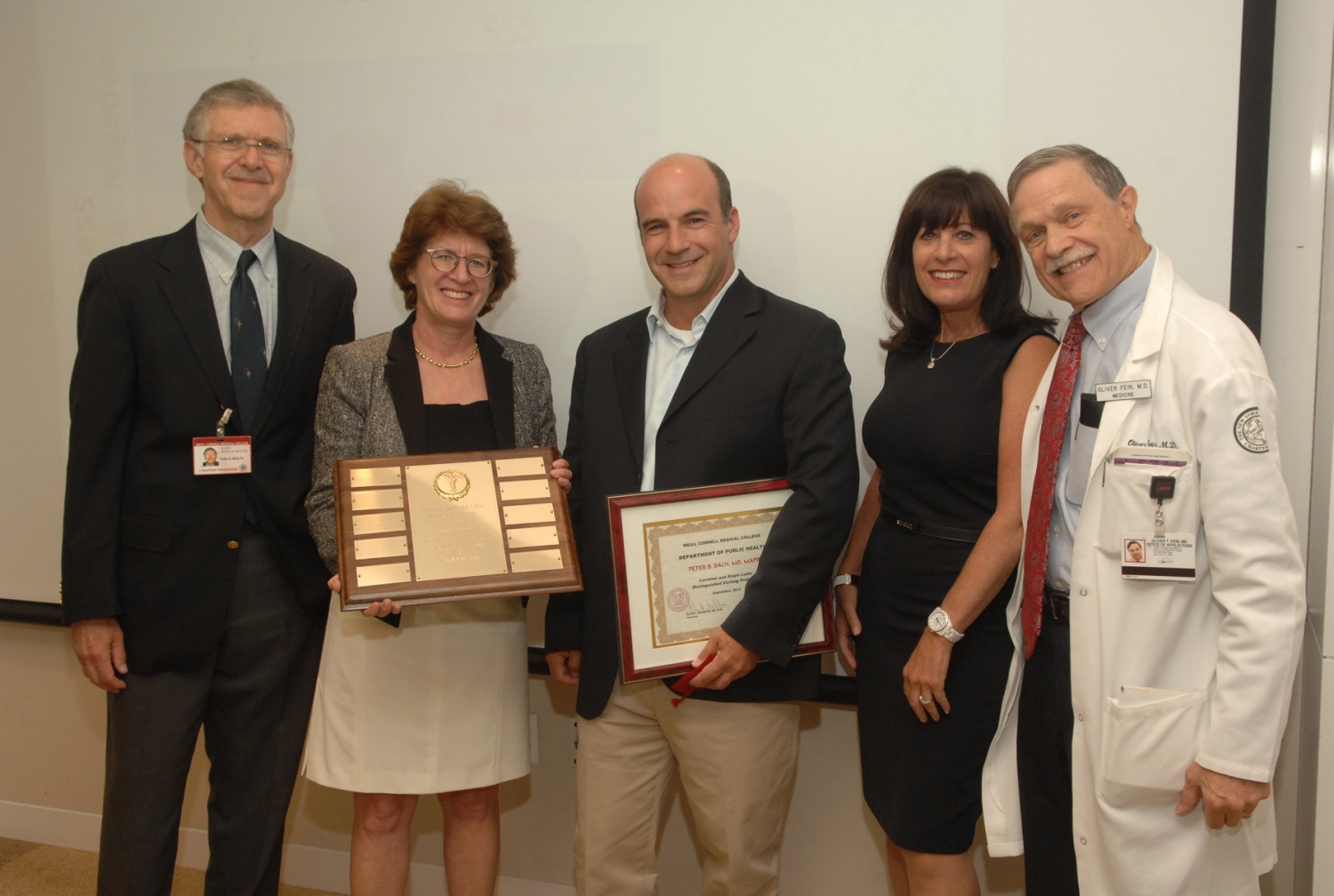On Wednesday, Sept. 12, Dr. Peter Bach, professor of public health at Weill Cornell Medical College and the 11th annual Lorraine and Ralph Lubin Distinguished Visiting Professor, presented the keynote lecture, "Intrinsically Incompatible: Comparative Effectiveness Research and Cost Containment," during the David Rogers Health Policy Colloquium at the Weill Greenberg Center.
In his talk, Dr. Bach, who is also director of the Center for Health Policy and Outcomes at Memorial Sloan-Kettering Cancer Center, argued that comparative effectiveness research, a major initiative of current health care reform efforts in this country, will not succeed in reducing costs as currently envisioned. Likening this initiative to the viewing of shadows by the prisoners in Plato's cave, he stated that focusing on comparative effectiveness research as the solution to our health care crisis makes us prone to see illusory solutions as real ones.
"The goals of CER (comparative effectiveness research) are to enhance quality, make care more patient-centered, make care more equitable, and improve outcomes. All of this has to also reduce spending and spending growth over the long term," said Dr. Bach. "But will, or can, CER accomplish these goals?"
Health insurance premiums in the United States have more than doubled in the past 10 years. The Congressional Budget Office projects that Medicare and other health programs will likely rise to 10 percent of the U.S. gross domestic product by 2035, compared to its current level of 5 percent of GDP. Even at current rates of spending, the U.S. spends a much higher portion of its per capita GDP on health care compared to other countries.
"Comparative effectiveness research aims to succeed by determining which approaches work best in many domains of medical care, including therapies, diagnostic approaches and care settings," Dr. Bach said. "We assume that what works best will cost less, but why would this be? And what if it isn't the case?"
As part of federal health care reform, the Patient-Centered Outcomes Research Institute was established and authorized by Congress to conduct research to answer these questions. Yet, both the Congressional Budget Office and the Centers for Medicare and Medicaid Services have stated that they don't think the savings produced by this research would be significant.
For savings to be achieved, Dr. Bach said, we would need to identify many situations in which what is currently being done costs more money than what is determined to be "best," or for which an equally effective but less expensive alternative exists. We would also need a way to act on this information.
Everyone agrees that "waste" is cost without benefit, Dr. Bach said. There is broad consensus that some medical procedures don't have benefit, such as MRI for acute low back pain, CT scans for new headaches with no history of trauma and abdominal aortic aneurism screening in women with no risk factors.
However, Dr. Bach notes, there are many procedures done for specific medical indications for which it is not as clear whether they are wasteful or not.
"So, are these tests really waste?" asks Dr. Bach. "Waste would be a 'zero effect.' But the comparative effectiveness research on these tests shows some value in a small number of patients. How do we draw the line? A lot of health care in the country today could be categorized as 'not quite waste.' We've found that as we spend more in health care, we see better outcomes, even though we may be operating inefficiently."
Another aspect of CER is to identify equivalent treatments that have different costs, in order to recommend the less costly alternatives. But this also is not cut-and-dried, Dr. Bach said.
"We need to ask: Are the treatments really equivalent?" he said. "And is there a difference between 'no evidence of a difference' and 'evidence of no difference'? This is an issue that hasn't been adequately examined."
Also, currently there are strict legal limits on the use of CER to determine health policy, restricting the findings from being used to determine payment by Medicare or private insurers.
"A better strategy might be to find a way to control the prices of drugs, procedures and devices," said Dr. Bach.
Dr. Bach is a leader in the field of health care policy research, particularly concerning Medicare, racial disparities in cancer care quality and lung cancer epidemiology. His research has focused on the quality of care received by black patients with cancer, as well as on a broader investigation into the role that physicians play in health care resource utilization.
Dr. Bach has served as senior adviser to the Medicare Administrator, a role in which he was primarily responsible for the Centers for Medicare and Medicaid cancer and data policies, as well as for educating the Centers' staff on therapies in oncology. He is involved with several organizations that aim to improve the health care system through program development and implementation.
The Lorraine and Ralph Lubin Distinguished Visiting Professorship in Public Health was established with a gift in memory of her parents from Dr. Madelon Lubin Finkel, professor of clinical public health and director of the Office of Global Health Education at Weill Cornell. The Lubins strongly believed in the value of education as a means to making a difference in the lives of others. Each recipient of the annual award has achieved the highest recognition in either the field of epidemiology or health care policy and is regarded as an excellent role model for students. In addition to presenting the keynote address at the Rogers Colloquium, the visiting professor meets during the day with medical students, faculty and members of the administration.

